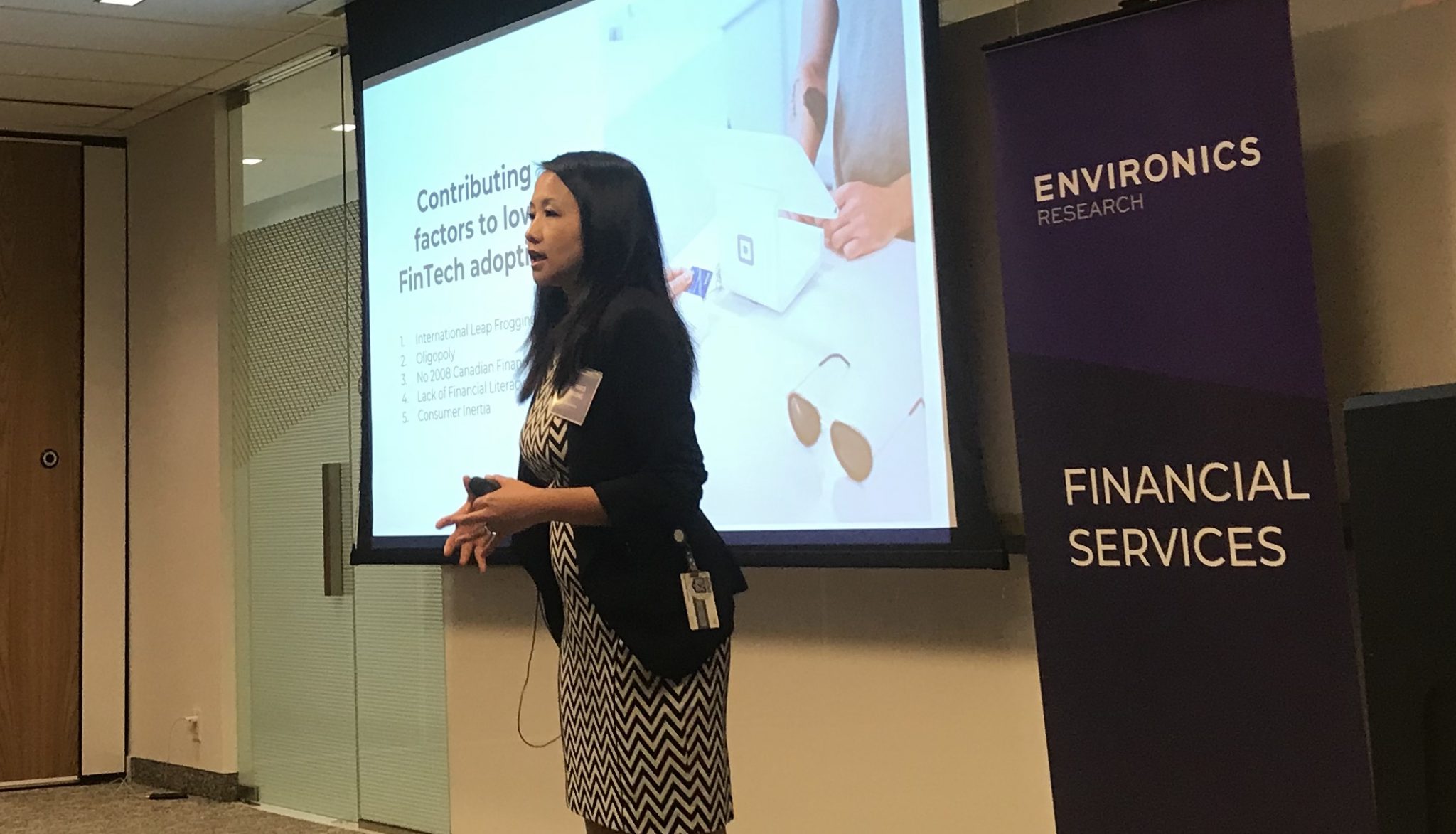
Insights From The FinTech Forum: Driving Canadian Consumer Adoption
ARTICLE
BY Bernice Cheung
Environics Research recently invited seven prominent guest speakers from FinTech companies, incumbent banks and venture capitalist firms to share their views about Canadian consumer adoption of financial service technologies..
The event kicked off with our VP of Financial Services Bernice Cheung providing an overview of the FinTech consumer adoption landscape in Canada as it compares to other countries. While top-ranked FinTech adoption countries like China and India hold adoption rates of 87 percent, Canada’s adoption rate of 50 percent ranks only 23rd. To begin answering the question of why Canadian adoption rates are so comparatively low, Bernice utilized Environics’ social values research to dig deeper and understand the values held by Canadian consumers in this sector, as well as their technology usage, and their attitudes toward financial technologies in general. Using values-based segmentation, Bernice identified four distinct groups of potential FinTech adopters: Enthusiastic Experimenters (16%), Adaptive Achievers (32%), Anxious Traditionalists (35%) and Reserved Skeptics (17%). Each of these four segments holds unique views toward FinTech that strongly affect their likelihood to adopt, or not adopt, new financial technologies. Organizations need to build a thorough understanding of these opportunities and potential barriers if they hope to stay competitive in this fast-moving sector.

Bernice’s opening presentation was followed by Randy Cass, CEO of Nest Wealth, who talked about his organization’s unique adoption strategy. Nest Wealth, an online investment platform that promises to make investing easier by using smarter technologies, primarily targets older, high-net-worth clients rather than the younger Millennial generation. With traditional money managers facing incredible challenges as their investors’ expectations increase, Cass believes that more advisors will look to new technologies to help them serve a larger number of clients in a low-margin environment. Cass also postulates that the net promoter scores of digital wealth companies would soon outperform their more traditional counterparts, lowering their cost of acquisition and allowing companies like Nest Wealth to better serve their existing clients.

Our first panel discussion of the day focused on overcoming the challenges of Canadian consumer adoption, and featured four leaders in Canadian FinTech landscape: Director, Venture Capital at National Bank Igal Ohayon; Director, Product and Strategy at TELUS Financial Services Mark DiFilippo; CEO of Borrowell Andrew Graham; and Senior Director, Enterprise Innovation at CIBC Fatema Pirone. The discussion explored various topics, including opportunities to educate and communicate new features more actively to customers. With low awareness levels of new FinTech products, there is often a need to simplify marketing messages and make them easier for consumers to understand.

In our second and final panel discussion of the day, Head of Business Development at Credit Karma Monisha Sharma and Partner at Portag3 Ventures Ben Harrison shared their views on how the Canadian FinTech market is different from that in the rest of the world, including such aspects as lower awareness of FinTech among Canadians, the relatively slow advancement of payment applications, and the need for more government intervention. The conversation also touched on the potentially very positive future of the FinTech industry, highlighting the many new FinTech companies Canada is attracting.

On the whole, the event was buzzing with passionate energy from both the speakers and attendees, and provided an incredibly useful learning opportunity for everyone involved. Going into this event, I’d been thinking about the future of financial services in Canada and wondering who might emerge as a winner in this quickly evolving sector. But the more I listened and learned, the more it became clear that there was another question to ask: How will traditional resources and new technologies evolve together to change the industry as a whole?
It’s clear that digital wealth will have a larger impact on the money management industry in the coming years, but this doesn’t mean that traditional financial advisors will disappear. The majority of Canadians still see the value of human advisors; and face-to-face interaction will remain important, especially in a bear market. With this in mind, it seems likely that traditional wealth management companies will continue to adopt more digital components to serve their customers better, while digital wealth management companies will likely integrate more human touches to their services.
For Canadian financial service companies, preparation for global competition has become extremely important. While these global competitors might not arrive in the near future, competition will surely come. Riding the wave smoothly by pro-actively learning from global cases, and even building global partnerships, would benefit these companies and help them hold a leadership position in the FinTech sector.
It’s clear that digital wealth will have a larger impact on the money management industry in the coming years, but this doesn’t mean that traditional financial advisors will go away.
Financial services are evolving in a variety of different ways and, in this increasingly competitive landscape, embracing the disruption and moving faster than your competitors will become more and more important. A key phrase that kept coming up over the course or our event was “customer-centric,” highlighting the idea that those who focus on their consumers’ needs and motivations will continue to be successful regardless of traditional or digital wealth solutions.
Building a strong in-depth understanding of your customers is a must-have. We saw that there are distinct segments of FinTech adopters in Canada, and each of these requires separate and dedicated marketing strategies tailored to their individual motivations and concerns. This is what will truly separate the winners and losers when it comes to FinTech in Canada.
Canadian FinTech Syndicated Study
Subscribe to our study and gain a unique understanding of not only who is adopting new FinTech products, but the underlying social values that are driving them to do so and why.
Find out how Environics can help your organization
Related insights



Toronto
366 Adelaide Street West
Suite 101, Toronto, ON
Canada M5V 1R9
416 920 9010
Ottawa
135 Laurier Ave W.
Ottawa, ON
Canada K1P 5J2
613 230 5089
Calgary
421 7th Ave SW
Suite 3000, Calgary, AB
Canada T2P 4K9
403 613 5735
